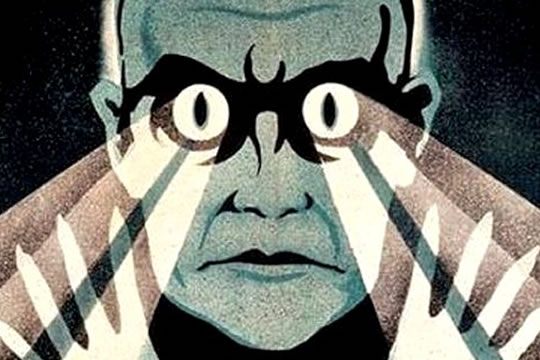Of all the things that I could be,
I could not be what I am not,
And of all the things that I could see,
I could not see that which is me,
And try as I might, to catch a phrase
or turn a word,
They're never heard,
These unmuttered words ...
I am a key, I am a lock,
I am the memories, you have forgot.
WE write everything out in triplicate, we inscribe it in the public records of the akashic memory. We incise such experiences as are, and as are invoked within our own memory, and we indelibly impress that repository of recall with all of the company we share.
To be seen through another's eyes may not distinctly run concurrent with the actuality of events and of lasting impressions. However with all folk, and for that matter all beings and all matter, we leave impressions of ourselves: our conduct, our vitalities, our desires and subsequent emanations - and not even so much in the karmic sense of such impressions rendered. We leave a 'scent' such is ours which indefinitely lingers.
The impact which we create with our relationship to all within the world is vital to our future associations. The reason for this is plain: if I am to rehearse something, I shall become ‘good’ at that something because practice is the art of incising memory impressions, which shall be locked into when confronted again by that which drew the original experience together. I may certainly become 'good' at something because of repetition, but moreover the reason for this is because I have laid down the memory, of which I may excel and improve upon. To repeat does not mean to further, however impressions within tangible records make this possible.
One can say too, that the ideas which may surround another man which directly concern you - as far as his impression and his personal recall - dictate another form of repetitive replay, which may hold effect upon certain parts of one's constitutional personality. It is unwise to keep company with those who misjudge you (unless of course they misjudge you for the better). Often a juvenile is corrupted to a greater degree by the actual suppositions and impressions of him, by those elders who regard him a criminal as from the first.
The powers of envisualizing do have effect upon what is to be 'brought out' in characteristics of others. Fear unfortunately, with certain images cast, shall attract to that man those attributes which are envisaged - if there is a level of weakness within the individual to begin with, which usually there is.
The question is for us: how often do we remember aright. Are we just and without criticism when we recall another? Or are they restrained to an embitterment or downcast by our demising dismissals?
We err and we damage the subtle bodies with subtle attitudes. And yes, mere 'thinking', or more correctly, our envisualizations as stimulated concurrently with episodes of memory, are potent and potentially destructive - particularly when there is a grievance, for such will be perpetuated by active recall; and the likelihood of the fellow partner causing more disturbance is incited by the repetition of his character-formation as cast by such memories.
If we were to consciously meet with every memory which does arise, and try to correct those elements within those individuals whose circumstances have brought pain within, and make of them what we should wish of for ourselves, then the pain would be eased in more than two ways. We may release our brothers to perfection, and for the sake of future worlds, it is imperative that we begin to do so.
How often one exclaims "Why, he is exactly as I thought he would be!". The memory impressions have begun with assumptions as placed upon the man in the first instance. How often there is a public man who is confused with an extraordinarily low sense of self, who unwittingly falls to near death or complete exit - impeded and imposed upon by dire public pressure of opinion.
We are not however, so distracted by those impressions as others hold, as to be overcome. For the main part we do remain our own person, with seasonal and cyclical fluctuations presenting opportunities in many levels of being and expression. But it is sufficiently important that one is mindful of the consequences and reactions stimulated from one to another. It is natural to try to please, and one can see from this explanation the psyche of the 'peer group', as is dictated throughout with expectation.
We are to be reminded that we never view the whole man when we relate to one of our brothers. Circumstances have but enlightened us to one or at best a few of his attributes, and we are not privy to see beyond that moment in time. We recognize that all men are capable of more - of giving more, of being more - and one can make it a constant practice to envisualize it so, when in company (and when out of company, for that matter).
Some may view this as an active lie or untruth, that the positive thinker is in some sense delusionary. However it must be reiterated, that the only truth about a man, is that he will always be more holy and inspired than we shall come to consciously recognize. All men may be troubled at times - conflicts are inherited that we might actually prosper from such - and we are all loved equally.
Our view of our fellow man is not as disposable as we would like to believe. Our active thinking, our impressions as given to the soul from such attitudes, remain with us and live within us - and not only do they hold attraction to the person with whom we share such memories, but they do also in the long run, make effect upon our own personalities. As we explore those elements which make for the greatest impressions: the outstanding, the vitally imbued - be them for good, or for disapproval - we begin to turn inwardly and explore those characteristics.
No wonder it was that the old monks went into retreat, far from society! (No wonder we do either! A joke.)
Test and be tested. If not today, then tomorrow! Our brotherly ties are of extraordinary importance, whereupon our most difficult, demanding and fulfilling obligation, is to come to understand and make peace with all men. Alike to the most complicated jigsaw puzzle imaginable, it is to accommodate soul with soul with soul. For this is active creation; the spill-off from those beginnings in which we were envisualised and impressed with the makings of a man. Our definitions are largely determined by us. Our projections return 360 degrees.
But what of oppressive thoughts, and oppressive people? Oppressive people usually demand that they be memorable - that they are not content to be regarded slightly. One has difficulty with such company because one may not necessarily wish to gravitate to their field of influence, as is asked. Furthermore, if one is trying to establish a healthy approach to this person, rather than fall prey to irritation, then there is a double task at hand :
1) Effort to distance oneself.
2) See beyond a tiresome personality to higher man.
Some folk actually feed from the attention of others. Remember back to the memory impressions activated within associates. In the case of the oppressive personality they actually strive to impress you as they would see themselves, and draw from such.
It is an interesting point because this can and cannot be done. It depends on the qualifications of will and conspiration of the individual concerned. Some do have a remarkable ability to impress upon another man exactly the image that they would wish to project - in the sense of that which is consciously drawn from. It becomes a twofold memory impression insofar as the soul draws its own conclusions and they remain, but are not actively recalled because overriding the true image is that picture as imposed upon the man.
Now usually, it may be said, the memory impressions are tinged (as before stated) with all sorts of personal presumptions which stray from the complete and comprehensive reality. Such examinations are given over to the soul but are individually characterized. In the case of the oppressive personality, this is also so: that the projections impressed willfully negate the opportunity for the individual to make of his own impressions, and rather does receive those as given to him. This scenario may be built upon in future repartee.
How suggestible are we? And how do we recognize our own misadventures in memory assumptions, whilst also those unwelcome impressions dictated to us? The greatest fortress of light is that of the truth. As simple as it may sound, a man of good character who ekes towards the humble and positive truths - concerning other men, concerning the world at large - will find that discrimination becomes an easier task and more refined, as more he refines.
Men can be suggestible as regards all manner of quirks and phases of being. So much of the day itself may be without motivation: self-motivation, active motivation. One wonders that if this is the case and the conscious activity is so quietened, then the individual in part, must give over to suggestions as offered elsewhere.
However men are stubborn too, which correctly says "I shall only be pushed so far!"; and will only abide an oppressive personality for so long. For although we may be in part impressionable as others would have it, we do know within when those impressions do not match: theirs with ours; that all is not right. And it is the submissive, who for many reasons, have to receive past that feeling, ignoring that knowledge, suppressing inner expression. Obvious to say, this is unhealthy.
If we can concentrate on the better man, even in the case of the suppressive personality, we shall find that the response from our partner is wonderful to behold. The encouragement we give, is the encouragement we shall receive. That not only for this reason alone, but nonetheless with it in mind, we are cautious and tardy as to hurtful recollections. We may re-impose within our own history notes those aspects which were formerly overlooked, that with maturity we may overlook the troublesome man and amend the past with the comprehension as to why it may have occurred.







No comments:
Post a Comment